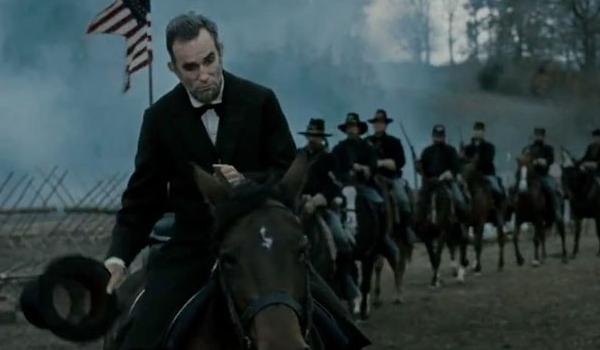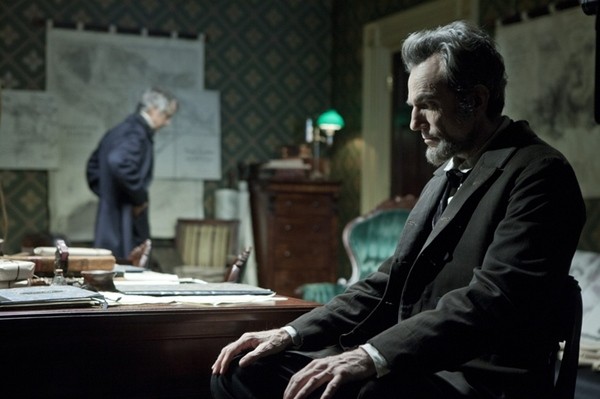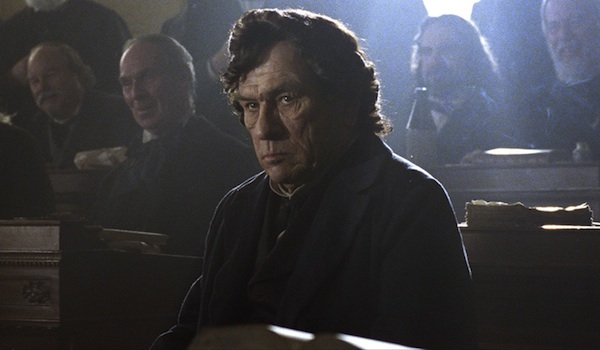Lincoln Review
Abraham Lincoln. Steven Spielberg. Daniel Day-Lewis. Any of these words alone commands a lot of attention and respect; put them together, and you have an almost inconceivable amount of reverence. “Lincoln” is reminiscent of the powerhouse Oscar biopics of the ‘90s and early 2000s, but unlike other recent biopics, it mostly measures up to the hype.
I say mostly, because as good as “Lincoln” is, the tendency will be to exaggerate it because of the subject matter and talent on hand. The film deserves plenty of praise, but it operates on the level of what you see is what you get. It lacks of the obscured themes and subtleties of more recent Oscar-winning fair, but the “old-school Oscars” nostalgia it evokes will assure that it sees a good degree of accolades.
The rock at the film’s center isn’t Spielberg, but rather Day-Lewis. The two-time Oscar winner known for waiting for, finding, securing and delivering unforgettable leading roles as though he knows something no one else in his profession does, will disappoint no one except those hoping to see another incarnation of Daniel Plainview from “There Will Be Blood.” Day-Lewis’ Honest Abe is calm, reserved yet every bit as commanding of the screen as Plainview. Day-Lewis knows everyone’s eyes will be on him, so he dials his performance down in a way that makes him even more prominent, while also reflective of an older Lincoln who is used to the “fame” and concerned most about his legacy.
“Lincoln” takes place in the final four months of the president’s life starting two months after his reelection (January 1865) and concluding with his assassination. So no, it’s not a traditional biopic, rather it shows Lincoln at a specific time in his life. You could also say the focus is less on Lincoln and more on passage of the 13th Amendment, which might’ve been a more appropriate (though less Oscar-baiting) title.
The even greater context is the Civil War, which is turning undoubtedly in the Union’s favor at this point in time, but with the body count mounting, Lincoln faces pressure to end it by any means possible. One of those means is the 13th Amendment, which would abolish slavery if passed in the House of Representatives, but Conservatives believe a peace agreement might be reached faster. Realizing peace talks/the Confederacy’s surrender could happen sooner than later and derail any chance for the passage of the amendment, Lincoln, along with Secretary of State William Seward (David Strathairn) puts all his muscle into winning over enough congressmen to secure the necessary two-thirds majority vote.
Writer Tony Kushner (“Angels in America”) keeps things straightforward in a film that could get lost in the intricacies Washington politics. Consequently, “Lincoln” is a rather accessible film, yet also a bit heavy-handed. Especially at the beginning, characters speak in rather detailed terms about, for example, the two-thirds majority vote, opting for clarity rather than authenticity of speech.
The script also paints Lincoln as a storyteller quick to snuff out verbal conflict with a good tale or two, usually ending in a humorous punchline. We get a good portrait of Lincoln’s personality in this way, though hardly a complex one. The complexity comes in with the subplot involving his relationship to wife Mary Todd (Sally Field), specifically in regards to their two (living) children, Tad (Gulliver McGrath) and Robert (Joseph Gordon-Levitt). Mary Todd gets a rather one-dimensional portrait. She’s clever, but ultimately defined by how traumatized she was when their son Willie died of illness a few years prior. Field has the gravitas to hold down the part well, but it’s far less interesting than the focus of passing the amendment in the main narrative.
“Lincoln” has its greatest degree of modern relevance in terms of how he had to secretly “buy” the votes of several moderates in the House. He promised jobs rather than uglier bribes such as money, but considering today’s issues with nepotism, it’s an interesting parallel, especially when you consider that this “dirty work” was done to achieve something so fundamental as securing liberty for an entire race of people. You can’t exactly blame him for using whatever tactics he could.
Outside of the man in the tall hat himself, Oscar winner Tommy Lee Jones should and will get noticed by awards bodies for portraying radical Republican congressman Thaddeus Stevens, who throws about some legendary (albeit archaic) insults at his Democratic opposers. He’s more than just comic relief however, as he gets a pretty substantial and well-rounded subplot that tests his character as well as Jones’ ability.
A number of other talents show up or play integral supporting roles in the film, but chalk that up to every actor demanding their agent get them a part in the Spielberg film about Lincoln. Parts played by Gordon-Levitt, John Hawkes, James Spader, Michael Stuhlbarg, Jared Harris, Hal Holbrook, Jackie Earle Haley and more could’ve as easily been played by unknowns, though they all do lend some extra legitimacy to the film as far as it being an event drama.
Also adding in this regard is all the top-notch technical work. Spielberg always has the best crews on hand for his films and “Lincoln” has an incredible visual color palette and the dignified look of a truly important historical drama. His camera is slow-moving and subtle so as to allow us to soak up Day-Lewis’ performance and all the intriguing drama. He also knows a thing or two about emotional catharsis, and while the scene in which the House votes on the amendment won’t bring you to tears, it’s still so darn moving — you feel as though you are truly witnessing history.
“Lincoln” doesn’t offer many surprises, but considering how thoroughly it handles politics and captures important themes about doing what’s right in such a pure way, history teachers will show it in class for years to come.
4/5 Stars
Directed by Steven Spielberg
Written by Tony Kushner, Doris Kearns Goodwin (book)
Starring: Daniel Day-Lewis, Sally Field, Tommy Lee Jones, David Strathairn








0 Comments
You can be the first one to leave a comment.